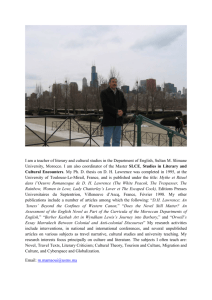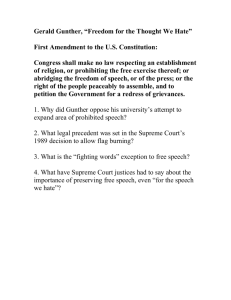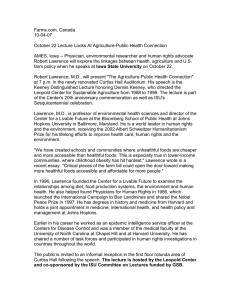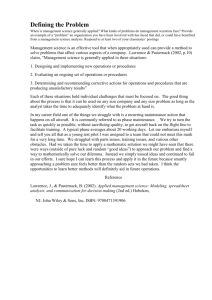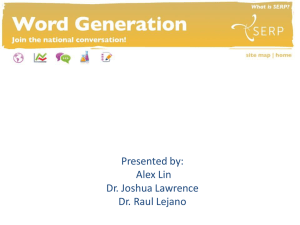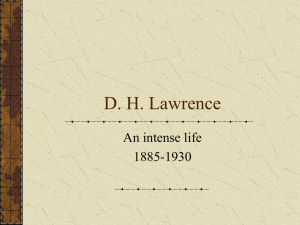by
advertisement
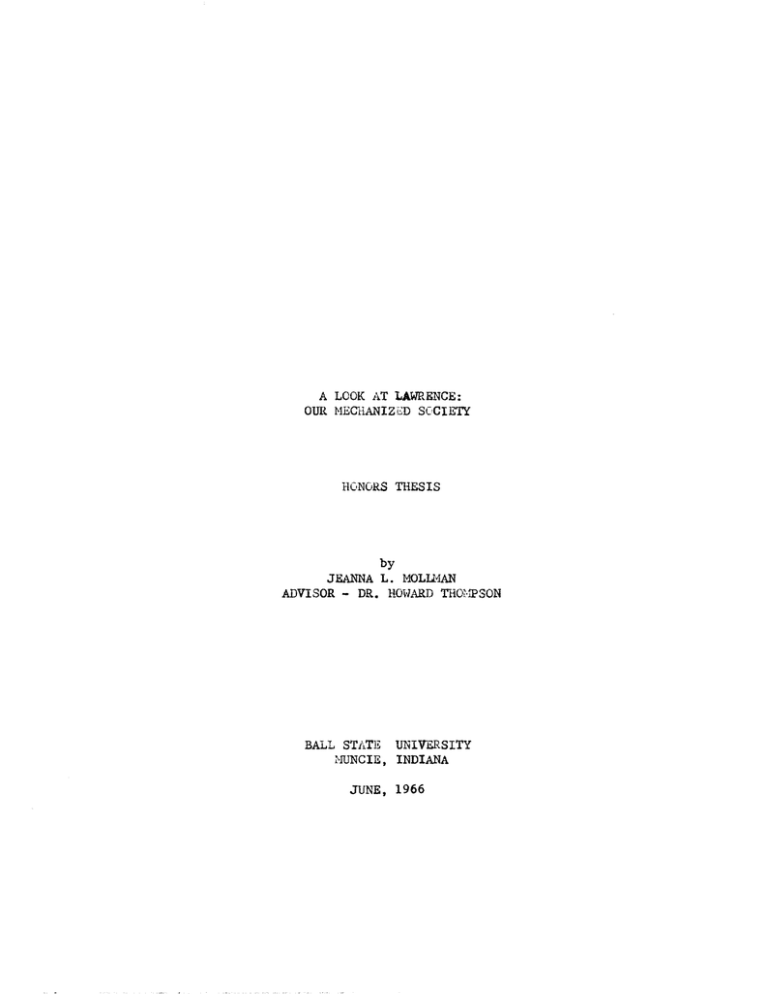
A LOOK AT LAWRENCE: OUR HECHANIZED SCCIETY He,NORS THESIS by JEANNA L. MOLU1AN ADVISOR - DR. HOHARD TH.OHPSON BALL STATE UNIVERSITY HUNCIE, INDIANA JUNE, 1966 Contents 1 Part I • Introduction of thesis • • 1 Discussion of secondary novels • Sons and Lovers ·• The Rainbow • --- . • Women in Love Conclusions. • • Part II. • • • • 3 • • • '+ • • • • • • 5 • 8 .11 • • .13 • Int.roduction of Lady Chatterley's Lover. • .13 Discussion of Lady Chatterley's Lover. • • .15 • .24 Conclusions. Bibliography • • • • .26 • i Any man of real individuality tries to know and to understand what is happening, even in himself, as he goes along. This struggle for verbal consciousness should not be left out in art. It is a very great part of life. It is not superimposition of a theory. It is the passionate struggle into conscious being. 1 Throughout his life, D. R. Lawrence, who made this statement, 'was involved in just this passionate struggle which he verbalized in a prolific production of novels, poetry and essays. It is important to the student of Lawrence to realize that this is a man who was passionately struggling all of his life to know and to understand what was happening in himself and in his world, and to verbalize his consciousness of this world. The kind of world Lawrence expresses is largely colored by two important elements of his early personal life--the passionate, emotional family unit to which he belonged, and the industrialized world of the collier in the midlands of England. Although it is impossible to discuss Lawrence without including his ideas of blood consciousness,2 of passion, of vital living, of the necessity of I E. W. Tedlock, Jr., "The Three Versions of Lady Chatterley's Lover," !! Descriptive Bibliography. 2"Blood consciousness" or "blood knowledge" are Lawrence's terms for an overall realization of the needs of the body. He says that we substitute ambition of the ego, the urge to power and pride, for the life of the body. This he Calls 'uental consciousness," but it is not to be assumed that he is anti-intellectual, only against perverted uses of the mind. 2 close emotional connections among persons, my primary concern is his conception of industrialism and its place in his view of living aa expressed in many of his novels. others only minor. it produces. In some it is a major theme, in He condemns industrialism for the society which OVer the period of his life, he expanded his original thesis, that industrialism is personified evil, to say that an industrial society, in which men are mechanical and make acquisition of inatE~rial goods their purpose in life, can end only in the downfall of civUization as we know it. Since the advent of the industrial revolution, serious writers and thi.nkers have been deeply concerned with its implications for man and his: society. Many English writers have complaaed of the meinnesa of the colliers' lives, of the ugliness and hopelessness of the induatrial midlands, of the deterioration of man caused by "the machine." Lawrence himself has been compared to Carlyle because he BeeDlS to follow i.n this tradition of critici". However, with Lawrence there is a diffe~enc.: Lawrence has first-haad knowledge of the industrial blight; he was born into the lower class, with a collier fatber and the ugly, grotesque mining world for his playground. So it is that "his first social responses were those, not of a man observing the processes of industrialism, but of one caught in them at an exposed point, and destined in the normal course to be enlisted in their regiments. 1t3 A. Lawrence was 3Raymond Williams, ItThe Social Thinking of D. H. Lawrence," Lawrence Miscellany, ed. Harry T. Moore. ~ ~ 3 able to escape this fate through the help of his mother and through his natural abilities, but "although she did help him evade the killing work of the pits, the mines stayed '-lith him, haunted hi.m always ...4 This early life and his struggles to escape it are a large part of the material of Sons ~ Lovers. Williams says of Lawrence's eatly years, While the thing was being 1ived ••• and while the pressures were not theoretic but actual, the inherited criticism of the industrial system was obviously of the greatest impor. tance to him.... It is not too much to say that he built his whole intellectual life on the foundations of this tradition. 5 La,·Jrence's verbal criticism of this industrial society which had produced him turns up in many of his novels and develops as he matures. In his early navels he describes the environment of his childhood and its industrial element; in later novels he eliminates the personal aspect and discusses industrialism as a universal evil which corrupts man. His use of industrialism and his unfolding criticism of it can be seen in his major novels. Sons ~ Lovers, Lawrence's tir$t major novel, largely autobiographical, shows the pressures whiCh stUnu1ated his criticism of the industrial system. In it we find elements of his view of industrialsim as a great evil. In The Rainbow, published in 1915, industrialism causes the divorce of the Brangwens from their intimate tie to the land and occurs in minor 4 Harry T. Hoore, "Status of D. H. Lawrence," New Republic. 5\-1111 iams, 2E.. cit •. 4 incidents as well. - Women in Love, originally a second half to The ~~--- Rainbow, first titled ~ Sisters, expands and develops his ideas so that it was necessary to write two separate novels with two separate themes. Although the girls of the two books have the same name, thc connection ends there; Women in ~ even the style of writing changes. develops further the conception of the dead industrial ma.n, a minor conc1:!pt in The Rainbow, with Gerald, God of the Hachine, acting the major role. Lawrence's final statement on modern m~n in a mech.;mized society was made in Lady Chatterley's Lover, written during the years just before his death. into entire book; The theme has now developed and, although Williams says that ItLnwrence was so involved with the business of getting free of the industrial system that he never came seriously to the problem of changing it ••• 1t6 in Lady Chatterley's Lover he does offer some hope that some men, and SOtle women, may survive it. Lawrence's early exploring of industrialism can be seen in ~ ~ Lovers, his first successful novel. It gives the reader an understanding of Lawrence's own background and its connection to his later works and ideas. A great deal has been written about D. H. Lawrence's early life suggesting everything from an Oedipus Complex to a dark mysticism. His own understanding of his growing up provides the story material of Sons and Lovers and he gives good reason within the book for some 5 of the many interpretations biographers have expounded. It is the result of his early attempt to "know and understand what is happening, even in himself." -- Soas and Lovers tells of the growing up of Paul MOrel, a minerls son, who lives in the midst of the Lawrencian industrial world. The novel opens with the simple statement, '''The Bottoms to 'Hell Ros t . ,,7 t succeeded lhese are housing developments of the mining district which are perhaps conventional on the outside, but in total, rather ugly. "So, the actual conditions of living in the Bottoms ••• were unsavory because people must live in the kitchens, and the kitchens opened onto that nasty alley of ash-pits." (SL, 4) As the boy grows up he is able to find relief from the depression of the mining district by trips into the still unspoiled country side, particularly going to Wiley Farm. experi.ence also. This is essentially Lat'lrence's Thus in later life he contrasts man in the industrial world with man in the natural world. This leads to his concept that the natural is the best and is the basis fo his emphasis on natural passions as the solution to man's plight in today's world. Although the setting of ~ Rainbow is entirely different from Sons and Lovers, there is in it a description of the change caused by the industrial revolution which clearly pictures what Lawrence saw and felt: 7 D. H. Lawrence, Sons and Lovers, p. 1. All future references to i thil~ book will be in p;ren'theses in the text by initials (SL) and page number. f 6 Wiggiston was only seven years old. It had been a hamlet of eleven houses on the edge of healthy, half-agricultural country. Then the great seam of coal had been opened. In a year Wiggiston appeared, a great mass of pinkish rows of thin, unreal dwellings of five rooms each. The streets were like visions of pure ugliness; a grey-black macadamised road, asphalt causeways, held in between a flat succession of wall, window, and door, a new-brick channel that began nmo1here, and ended nowhere. hverything was amorphous, yet everything repeated itself endlessly. 8 Thus we see the coal mines destroying the beauty of the natural countty side. In The Rainbow the opening setting is in the countryside of an older England where farms, natural elements, and simple living dominate; the story is of several generations of Brangwens. the s~ne They have lived on farm for many years and have a close, an intimate, tie to the very land. In this example of Lawrence's perfect society, the early "Brangwens Came and went without fear of necessity, ~-lorking hard because of the life that '-las in them, not for want of the money." (TR, 1) As the story progresses, industrialisu encroaches on both the farm and the family until in the final half, the book discusses Ursula, a modern woman, who longs for the old blood consciousness but is unable to achieve it with her lover, Skrebensky, "The modern, socialmechanical man.,,9 Lawrence condemns industrialism for the society 8n. H. Lawrence, The Rainbow, p. 344. All future references to this book will be in parentheses in the text by initials (TR) and page number. 9Tedlock, 2£. cit. 7 it produces and the men it produces who are, like Skrebensky, "stiff and wooden," and "like nothingl" (TR, 342) Kenneth Young suggests that "there is a tendency in The Rainbow to use facets of industrialism as elements in a poetic myth," and that these facets are tossed aside without eXI)lanation when their part is played. 10 There is some truth to this. In the chapter "Shame" Ursula becomes involved with her tencher, Hinifred Inger, in a ilomosexual relationshiIJ. Ursula is soon repulsed by the older woman who "at the bottom ••• was a black pit of despair." (TR, 343) Ursula sees her way out through marriage for Winifred to Ted Brangwen, her uncle. Ted Brangwen, who plainly sees Ursula's inten- tions, is an early example of Lawrence's dead industrial man, and, being at the end of his desires, does marry the teacher. l~ had done the things he had wanted to. They had all ended in a disintegrated lifelessness of soul, which he hid under an utterly tolerant good-humour. He no longer cared about anything on earth, neither man nor woman, nor God nor humanity. He had come to a stability of nullification. He did not Care any more, neither about his body nor about his soul. (TR, 343) Ted Brangwen, collier manager, continues "serving the machine," (TR, 349) and is joined by Winifred who "in the monstrous mechanism that held all matter, living or dead ••• did achieve her eonsumation and her perfect unis.n, her inunortality." (TR, 349) Thus they have accepted "dustr4a "1 or SOC4a " 1 f unct~on. . 11 " 1"~ves to t he ~n an d surren dered t h e4r lOKenneth Young, ~ ~ Lawrence, p. 24. IlF. R. Leavis, ~ ~ Lawrence: Novelist, p. 168. 8 This incident, then, disposes of the teacher, now that the homosexual experience is finsihed, and perhaps Young was right in saying that facets were merely thrown in and then forgotten. However, this small incident of ~ Rainbow end its concept of the. dead industrial man is enlarged to become a major theme in ~Yomen in Love, where Gerald is the main symbol of the industrial man. Ted Br41lgwen and his "disintegrated lifelessness of soul" are recalled in Gerald Grich, another industrial magnate. "The book is again about emptiness of soul which Lawrence saw as the outstanding characteristic of his time; but now it is seen throughout society, from the miners, through the Bohemian, arty circles ••• the house party society ••• and the industrialists. tll2 This last group is represented by Gerald and his fDther, and in a perverted form, by Loerke. The father' wanted to run the r:lines on love,13 but he found that as he "triumphed in the world, he beeame more and more hollow in his vitality, the vitality was bled from within him, as by some hemorrhage," (WL, 200) and he was unable to lov~ one, including his wife who then withdrew from society. The any- father has failed at life and realizes this on his deathbed; he attempts to make his life lolorthwhile by giving the child Winifred, 12 Young, OPe . £.!:!., p. 25. 13 D• R. Latvrence, Women in Love, p. 217. All future references to this book will be in parentheses-li the text by initials (\VL) and page number. 9 a chance to live, in a Lawrencian sense. of the word, knowing beauty and expressing herself in her art. During the father's illness Gerald takes over the mines. In The Rainbow we realize that the colliery is not merely a colliery, but rather "the great machine that has taken us all captives." (Ta, 349) In Women in Love Gerald,becomes a willing victim to the machine also: l-laS the stream of miners flowing along the causeways from the mines at the end of the afternoon, thousands of blackened, slightly distorted human beings with red mouths, all moving subjugate to his will. He pushed slowly in his motor-car through the little market-top on Friday nights in Beldover, through a solid mass of human beine;s that were making their purchases and doing their weekly spending. They were all subordinate to hiln. They werp ugly and uncouth, but they we.re his instruments. l~ was the God of the machine. (WL, 215) He Gerald likes the power of the managing job. he does not work for money. Like the Brangwens, For Gerald "the subjugation itself was the point, the fight was the be-all, the fruits of were m'~re resul ts ••.• It (WL, 216) ~~ctory In the earl ier novel, Lawrence created his perfect society, one ne&r nature and one where men did not work for money; in the perfect society work is simply a natural part of living. With Gerald, far removed from the perfect society, work has become the central purpose of life, the "be-all~' In his position of authority, Gerald finds himself a part of the system, a syste~ which works as a machine: It was like being part of a machine. He hio.llSc1f happened to be a controlling, central part, the masses of men were 10 the parts variously controlled. This was merely as it happened. As well get excited because a central hub drives a hundred outer wheels--or because the whole universe wheels round the sun. (WL, 219) Lawrence, of course, is being sarcastic here; it is just such a natural \~nder as the solar system which should create supreme delight and exciterllent for man. syst~n, Gerald, however, has been caught up in the and can no longer appreciate non-mechanical beauty. l~ sees himself as only a part of a massive machine and he sees other men as mere objects, "parts variously controlled." captiv'e to the machine. He is completely But suddenly he becomes afraid: He had succeeded. He had converted the industry into a new and terrible purity.... But now he had succeeded --he had finally succeeded. And once or twice lately, when he was alone in the evening and had nothing to do, he had suddenly stood up in terror, aot knowing what he was.... But his will yet held good, he was able to go away and read, and think about things •••• His mind was very active •••• But he could not react.... It was as if his centres of feeling were drying up. (WL, 224-5) TIlis tendency to lose one's ability to feel and yet to stay mentally alert is what Lawrenee eaye has happened in our mechanized SOCiety. Gerald is captive, and he and his eventual mistress, Gudrun, both must turn to sensation because they are incapable of real emotion, their "centres of feeling" are dried up. Gudrun, a ~man produced by our mechanized society and incapable of real feeling, finds the pervert Loettke mentally attractive and it is logical that she turns to him from the entirely unsatisfactory physical battle with Gerald. He can satisfy the needs of her mental consciousness by conversing about ideas and art. 11 Loerke is also entangled in the mechanical society. creating a giant fresco for a factory. He is He tells Gudrun that "Art should interpret industry as art once interpreted religion." (WL, 415) Lawrence sees industry as the new religion of the masses. Under Gerald's guidance the mines have modernized with ne,.T cutting machines (ironically called "iron men" (WL, 223» brought in and the men forced into working conditions \mich are tightly organized. The joy went out of their lives, the hope seemed to perish as they became more and more mechanised. And yet they accepted the new conditions. They even got a further satisfaction out of them. At first they hated Gerald Grich.... But as time went on, they accepted everything with some fatal satisfaction. Gerald was their high priest. he pepresented the religion they really felt.... There was a new l,rorld, a new order, strict, terrible, inhuman, but satisfying in its very destrlilctiveness. The men were satisfied to belong to the great and wonderful machine, even ,,,hile it destroyed them It was what they wanted. It was the highest that man had produced, the most wonderful and superhuman. They were exalted by belonging to this great and sup~rhuman system which was beyond feeling or reason, something really godlike. Their hearts died within them, but their souls were satisfied. (\VL, 223) So now the common people, the artist, and the ruling class are all ~plicated in the sUbjugation to the machine. Gerald has been taken captive by the urge to power, and the miners have accepted "the machine" and its requirements of them as religion. It is important to note that it is the society, the mechanical nature of society, not the machines in actuality, which really destroys the men. and more meChanised;" The miners' lives have '~ecome more Gerald thinks of himself as "god of the 12 machine; he insists to Sir Joshua at Her::lione t s party that society is a mecl~,anism; 14 he even thinks in terms of "the great social productive machine." (WL, 219) Williams says, disintegrated, smorphous: These are the continuing key words to describe the effect of the industrial priorities on individuals and on the whole society. It is this condition of mind, rather than industry as such, which is seen as having led to the ugliness of an industrial society, on which Lawrence is always a~phatic. 15 ~~chanical, Eugene Good heart agrees that it is the mechanical nature of society which Lawrence is attacking. "'\Vhat distinguishes Lawrence's attack: on mechanical civilization ••• is his thorough-going vision of the, character of social organization. The industrial organ- ization of society merely exposed its generic mechanical character. tt16 nlis mechanical character of society is the corrupting factor of men. It will kill all humanness as it killed Gerald Grich, freezing the life out of mankind. l4Le aVLs, . OPe 15\oJ'.:Ll 1.Lams, "t ~. . ~. ~. 16Eugene Goodheart, !!:!! utopian Vision ~ E.:.. !!:. lAwrence, p. 7. The concepts being developed in these. three novels are concentrated into one overall view of the world which is clearly expressed in Lady Chatterley's Lover, a novel lvritten to be a frank statement on natural and honest sex, but which is also an emphatic commentary on contemporary society. The industrial midlands is again the central setting and the ugliness of the mines is again contrasted with natural surroundings, this time the estate woods. The industrial dead men, reminiscent of Ted Brangwen and Gerald Crich, have now centered their lives on attaining wealth, and fame through wealth. Thus the world of Lady Chatterley's Lover is the comp1e.te antithesis to the perfect world in the opening of TIle Rainbow. "Blood consciousness" has given away completely to ''mind consciousness," so that men are willing to consider the functions of the body as a necessary, but soon to be eliminated, process, and sex is notting but a conversation or cocktail in which a member of the opposite sex participates. These ideas are expounded again and again throughout the book, in its plot, in the conversations of Hellors and Connie, in the words of even minor charncters like TomrllY Dukes. T~~y Dukes is not even a partially developed character in Lady Chatterley's Lover; he is merely one of the intellectuals who share in high brow conversations \-lith Sir Clifford at \vragby. 14 Yet in his minor part he is a protagonist of Lawrence's own views,17 as well as an oracle for Connie. 18 Dukes is the only member of the intellectuals to have "faith in the body ••• but even he lacks the means of realization, is passionless while he believes in . pass~on." 19 His statements, however, on society and its future give a glimpse of what Lawrence is attempting to say within the concept of the entire novel, redefining, regrouping, and presenting in a new light ideas already expressed in previous works: I consider our social life in the west half-witted •••• So I even consider our far-famed mental life half- witted.... \o/e're all as cold as cr~tins, we're all as passionless as idiots •••• One has to be human, and have a heart and a penis, if one is going to escape being either a god or a bolshevist. (LGL, 43) something wrong with mental life, radically. It's rooted in spite and envy, envy and spits. (LCL, 40) Ther~'s While you live your life, you are in some wayan organic whole ,"ith all life. But once you start the mental life. you pluck the apple. You've severed the connection. between the apple and the tree: the organic connection. And if you've got nothing in you life but the mental life, then you yourself are a plucked apple. \LCL, 41) Our civilization is going to fall. It's going down the bottomless pit, down the chasra. And believe me, the only bridge across the chasm will be the pltallus. (LGL, 83) There might even be real men, in the next phase. Real, intelligent, wholesome men, and wholesome nice women! Wouldn't that be a change, an enormous change from us? We're not men, and women aren't women. We're only l7Tedlock, ~. cit., p. 299. 18D• H. Lawrence, Lady Chatterley's Lover, p. 62. All future references to this book will be in parentheses in the text by initials (LCL) and page number. 19Tedlock, ~• .s!!., p. 300-1. 15 cerebating make-shifts, mechanical and intellectual experiments. There may even come a civilization of genuine men and lromen, instead of our little lot of clever-jacks all at the intelligence age of seven. (LCL, 84) Give me the resurrection of the body! But it'll come, in time, when we've shoved the cerebral stone away a bit, the money and the rest. Then we'll get a democracy of touch, instead of a democracy of pocket. (LCL, 84) Dlkes has concisely criticised our half-witted social life, our half-\\ritted mental life (the latter perhaps the Cause of the former?); given his prediction of a future society with "real men" where ''mone,' and the rest" are tossed aside in fnvor of a "democracy of touch," and Hhere the body will be resurrected; and has suggested that the "only bridge" from the one to the other is the phallus. Through Dul.es Lawrence has given the reader in the first 80 pages an outline of the whole problem of the novel, suggesting \~hat is wrong \"ith society today and perl1aps how it may be corrected. The rest of the book simply enlarges and applies to a story line these concepts. Lady Chatterley's Lover is essentially a condemnation of our society. "Ours is essentailly a tragic age, so we refuse to take it tragically." (LCL, 1) It is a condemnation of its mechanical nature and the men it produces who nre Dentally alert, but dead to passion. Tedlock maintains that the book contains "Lawrence's most thorough-going attack on conventional society." 20~., p. 279. 20 16 Of this society Lm·rrence says, "Never was an age more sentimental, more devoid of real feeling. more exaggerated in false feeling. than QUr own." 21 It is also a touching story, a romantic tale, of two iso1at:ed people from far different worlds who find new meaning in 1 He t~hrough the tenderness of their love for each other. Their tale is told against the guly background of miners and coal mines, which they escape by going into the woods to a rustic hut. The naturl;ll world of nature and natural passionate love of Connie and He,llors is vividly contrasted with the world of industry and intellectual activities of Sir Clifford. Constance Chatterley is the wife of Sir Clifford, a half paralyzed invalid who writes "clever, rather spiteful, and yet, in some mysterious way, meaningless" stories. (LCL, 15) Because her life is so meaningless, Connie becomes physically ill: "Her body was going meaningless, going dull and opaque, so much insignificant substance. H • It made her feel immensely depressed and hopeless, with no gleam and sparkle in the blesh.... The mental life! Suddenly she hated it with a rushing fury, the swindle!" (LCL, 79) Lady Chatterley does not fit into Sir Clifford's intellectual \o1orld, being one of wwrence's passionate char:,cters, a "live" person. It is natural that the deprivation of hersspritual and 2l D• H. Lawrence, "Apropos of Lady Chatterley's Lover," ~, Literatu.E!:., and Censorship, 2:-'. 89. 17 sexual nature should lead to physical illness. Lawrence must revive; her by nourshing these aspects of her being. Sir Clifford Can be taken "as the living image of everything that Lawrence hated in European civilization: he is the symbol. of impotent power generated by wealth, he is sexually and spiritually maimed by the war; ••• he is to some degree Gerald of WOmen l:!! ~ grown into middle age. ,,22 He too manages a colliery, and as: he is made captive to the system of industrial production, his di.sintegration is complete: as pulp. "Inwardly he began to go soft But outwardly he began to be effective." (LCL, 121) Howeve,r, it is to the bitch goddess, money, rather than simply to the machine, that Clifford prostitutes himself. Connie and Clifford represent the modern marriage of two people, who marry because they are mentally attracted to one anothe.r. At first this may be enough, may even be exciting and seem fulfilling, but it soon loses all meaning because it is unable to provide renewal through its union, and degenerates merely to a habit. As Sir Clifford tells Connie, "You and I are marrie,d, no matter what happens to us. other." (LCL. 49) We have the habit of each For Connie and Clifford it must end in almost hatred, destroying Connie'S passionate nature, "eating her life away," (LCL, 109) and, making Clifford eVer more dependent on 22Horace Gregory, b. H. Lawrence: Pilgrim of the Apocalypse, p. 80. 18 outside forces to satisfy his mental consciousness, his need for power and importance. Connie is advised by her father to Save herself by taking a lover, and it is through Mellors that her life does become meaningful onCe more. Hellors is "the most nearly perfect of all of Lawrence's recreations of the ideal man,"23 Gregory. according to He is the natural man, living simply and spending his time as close to nature as he can get. He is basically cut off from modern society and "quite consciously afraid" of it, knowing it to be a malevolent, partly insane beast. (LCL,137) At his first appearance he reminds Connie of Tommy Dukes (LCL, 52) and soon tnereafter becomes Lawrence's main spokesman. Mrs. Bolton who comes to care for Clifford when Connie gets ill, is an occassional spokesman for Lawrence, also, having known something of what he advocates as the salvation of mankind \"ith h'er own husband. However, she "is a mf xed character ••• she is a symbol of true feeling in her still living love for her dead husband ••• she represents the class struggle in her hate for the masters ••• has the L:~odern faults of desire for dominance and possession ••• and helps Constance deceive Clifford.,,24 23 Ibid. t p. 82. 24Tedlock. ~. ~l, p. 300-1. L9 It is through these characters that La•..rrence atte1lpts to reveal the nature of today'::; society and to offer his solution. In a regular bull session at Wragby. one of the intellectuals obserVes that "The ideal must be mechanical. The only thing that i.s a unit, non-organic, composed of many different, and equally essential parts, is the machine. part ...... (LCL, 42) Each man a mechine- Tommy Dukes takes the thought further by saying, "But also, it seems to me a perfect description of the whole industrial ideal.... It's the inevitable outcome of forcing ideas on to life, of forcing one's deepest instincts; our deepest feelings we force according to certain ideas. with a fonaula, like a macnine." (LCL, 42) We drive ourselves In this conversation Lawrence has establ ished the attitude to,vard machines and the mechanical principle which he believes is held by the intelligent peoplE~ of the modern world. He enlarges this idea by having Dukes exprefls what Laurence sees as the reason for the mechanization of all society; the inevitable outcome of forcing the natural instincts of man inte mental patterns is a mechanical society. Clifford sees industry also as the god, the giver of life: "The industry comes before the individual •••• Who has given the colliers all they have that's worth having; all their political liberty, and their education, such as it is, their sanitation, their health-conditions, their books, their music, everpthing." (LCL, 210-1) Connie hopelessly replies, "But who has taken away 20 from the people their natmral life and manhood, this industrial horror.... ~nd given them Their lives are industrialised and hopeless, and so are ours." (LCL, 211-2) Connie is able to realize that giving men things and taking away the opportunity for them to nct as individuals, as men, must then destroy their manhood. She also knows that Clifford, and others like him who have created this situation or who perpetuate its horrors, is also being destroyed. Mellors, who has groHll up Hithin this monster, is attampting to salvage some of himself by retreating from this comtaminated society into the solitude of the woods. But even in his isolation he must fear what it uay do to him: The fault lay there. out there, in those evil electric lights and deabolical rattlings of engines. There, in the world of the mechanical greedy, greedy mechanism and mechanised greed, sparkling with lights and gushing hot metal and raaring with traffic, there lay the vast evil tllin(;, ready to destroy whatever did, not confonn. SOOR it would destroy the wood, and the blubells would spring no more. All vulnerable things must perish under the rolling and running of iron. (LCL. 136) Having become the main spokesman for Lawrence, he is able now to commen~~ on the society of the times with all of Lawrence's force, stati~~ its evils, its avarice, its destruction of the natural man. Ha]lors bitterly says the result of this society is that men now work for ,Goney and that they are therefore dead. It's because you've spent your time working an' caring for money. You can't talk nor move nor live, you can't properly be with a woman. You're not alive. (LCL, 256) 21 It's a shame, what's been done to people these last hundred years; men turned into nothing but labour-insects, and all their manhood taken away, and all their real life. I'd sipe the machines off the face of the enrth again, and end the industrial epoch absolutely, like a black mist~ce. (LCL, 257) Again, it is everyone who is iraplicated in the condemnationl reminded of the coal :::iners and magnates of \.[omen We are The 2:!!.~. humanness of man is desappearing and the natural spirituality of man is being perverted into worship of the common people have succumbed to se~,ing mech~~mical ideal. The only money, and this, according to Mellors, has killed them. Their spunk is gone dead. V.IOtor-cars and Cinemas and aeroplanes suck the last bit of them ••• just killing off the human thing, and worshipping the mechanical thing. Money, money, m,.ney! All the modern lot get their kick out of killing the old human feeling out of man. making mincemeat of the old Adam and old Eve. They're all alike. The world is all alike: kill off the human reality.... Pay money, money, money to them that will take spunk out of mankind, and leave 'em all little twiddling machines. (LCL, 253) The implication of the upperclass is Cliflord. present~d by Sir In praise and emulation of the technical abilty and money- making skills of modern business men, he submerges his own knowledge of them--that modern indsutrial giants are feeble boys. It was astounding the ingl;!nuity and the alr.lost uncanny cleverness of the modern technical mind, as if really the devil himself had lent fiend' s ",its to the technical scientists of indsutry ••.• In this field, men were like gods, or demons, inspired to discoveries, and fighting to carry them out. In this activity, men were beyond any mental age calculable. But CliUord knew that when it did come to the emotional and human life, these self-.ade men were of a mental age of about thirteen. feeble boys. (LCL, 122) 22 Lawrence is conderming the scientific man, the modern man, becuase he will not allow himself real feelings. are killed by his Lrrental activities. mental feelings and real feelings.... His feelings "How .different they are, This feeling only what you al\oYl yourselves to feel at last kills all capacity for feeling and in the higher emotional range you feel nothing at a11,,,25 he says. The re:sul t is, of course, that everything becomes meaningless. The universe is dead for us, and how is it to come to life again? "Knowledge" has killed the moon, it is a dead little earth fretted with extinct craters as \vith small pox; the machine has killed the earth for us, mo.king it a surface, mo,~e or less bmu[)y. that you travel over.26 It may seem here that Lawrence is attacking and desiring the destruction of intellectual thiru~ing, but he is really attempting to re-establish our equilibrium. not destroy it. "In attacking industrial civilization and its mechanization of the living, which often took the form of the intellectualizing of natural impulses, Lawrence was not trying to destroy what he called 'mind knowledge' but to bring it into balance with'blood knowledge' of the kind celebrated in Ladl Chatterley's Lover.,,27 Lawrence wants us to see the beauty of the natural \vorld, to get excited "because the whole universe Ylheels aroune; t:-'e!l''' (WL, 219) which is just w.t.;:,t Gerald, Clifford, and other modern men are not able to do--because they have. intellectualized the natural impulses. 25 Lat~ence. Apropos, p. 88. 26~., p. 107. 1:..E. 27Harry T. ~ore, "Lady Chatterley's Lover as Romance," H. Lawrence ·I>1iscellany. 23 Instead, men prefer to elil-ninate the body altogether. I'SO long as you cen forget your body, you are happy. And the be momen t you beg in to '\ a\.;are 0 f your body, you are wre t c hed. So, if civilization is any good, it has to help us forget our bodies." (LCL, 83) Clifford. obviously in favor of the mechanical society, would like to, at least, do alvay with body functions: "1 do think sufficient civilization ought to eliminate a lot of the physical disabilities. as well go." All the love ... business for example, it might just (LCL. 83) Connie "the perfect woman, living ••• completely within Lawrence's 'phallic consciousness ... 28 is unable to function in such an atmosphere; she feels "forlorn" and unused ••• a mere thing of terrors." (LCL. 129) She felt weak and utterly forlorn. She wished some kelp would come from outside. But in the whole world there was no help. Society was terrible because it waS insane Civilized society is insane. ~1oney and so-called love are its two great manias; ,!loney a long way first. (LCL, 109) Hellors, too, must escape the money mania: "Let's live for summat else," he urges, "Let's not live ter make money. neither for ourselves nor for anybody else •••• life, and go back! (LCL, 256) Let's drop the ",hole industrial Lawrence sees the salvation in "touch" which Connie discusses with Brs. Bolton who later helps her in her affair with Nellors because ''when I see a woman as 28Gregory, ~. ~., p. 82. 24 cares,. my heart stands still for her." (LGL, 211) Connie asks, "But ean a touch last so long?" "0£1, my Lady," replies last "II (LCL, 190) i.'~rs. Bolton,"~fuat else is there to Thus, Connie is drawn to Mellors who is perhaps anti-intellectual, but surely the antithesis of Clifford and what he stands for. Together they begin to establish a new life, going through a period of purification and chastity while they wait for the di.vorces to be granted. ~1ellors toward n farm of their \.]hether their solution is practical O\.nl. turns to farm labor, looking or workable is left to the reader, since they are still in the waiting process at the book's close, but there seeelS to be some reaSon to hope for their happiness. This, then, is Lawrence's final statement on the industrial tvorld and the mechanic;',l society it produces and illuminates. sums up the central conflict this way: He "So, in Lady Chatterley's Lover we have a man, Sir Glif..:ord, who is purely a personality, having lost entirely all connections with his felloH men and ,'Jomen, eXc2pt those of usage.... He is a pure product of our civilization, but he is the death of the great hu:.,anity of the world. ,,29 Opposing the emptiness of Clifford is the game keeper, the other man, Hilo "still has the warmth of a man, but destroyed. rwhQI is being huntL~( dotm, Even it is a question if the woman \"ho turns to him 29 Lm.,rence, Apropos, p. 109. 25 Hill really stand by him !.nd his vital meaning ... 30 Lawrence has through this central confl ict, condemned the mechanized men ,,,ho only seek material wealth and WelO i(3nor the natural and vitally necessary physic:al functions of the body. in a return to nature, as ~1ellors His solution is offered briefly first turned to the woods nnd then to the farm labor, and a revival of feelings, of nntural er"otion, of honest l:assion, such :,s Connie and r'ellors establ ished. Ursula of The Rainbol" also trnveled the road behleen nature and industrialism, but in the opposity direction f.,Dm Eellors. She began with her roots in the natural life, in the Brangwen farm life, and moved on into the industrial .vorld. of Wom~ in ~, In the beginning she reviews this journey to h.:;rself: "She thoUf:ht of the l1arsb. the old, intimate farm-life &t Cossethay. i>Jy God! how far she was projected from her childhood, how f~r was she still to go! In one life-time one trnvelled through aeons." So, too, hag Lawrence traveled a long tvay since his childhood. Frou the early established criticism of industry he had developed a theory of society, an understanding of whut was happening and what had hapr'ened, and a hope for what ,,,ill happen. After a long period of gloom and gray predictions, he had arrived at a -ope for mankind. Eut it is a very small hope, for Lmvrence also realized that man still has far to go. 26 Bibliography Books Aldington, Richard. 1930. Auden, W. H. The ~ D. H. Lawrence. of Anxiety. London: Chatto and waadus, London, 1948. Goodhe,ard, Eugene. ~ Utopian Vision of ~. H. Lawrence. The University of Chicago Press, 1963. Gregory t Horace. D. H. Lawrence: Pilgrim Ne.w York: Grove Press. Inc., 1933. Lawrence, D. H. 2f the Apocalypse. Sex, Literature and Censorship. -------. Phoenix; The Posthumous Papers Ne,w York: Vikingpress, 1936. Leavis, F. R. D. H. La\oJrence. Co., 1952. Chicago: 2f £. !!. London; 1929. LaHrence. London: Lcngmans, Green and Moore, Harry T. (ed) ~~.~; Lawrence Miscellany. Southern Illinois University Press, 1958. Tedlock, E. \.]. ~ Descriptive Bibliography. University of Nelv Nixico Press, 1948. Chicago: Albuquerque: Warburg, Jeremy. The Industrial MUse: Tne Industrial Revolution in~ English Poetry. London: O'XfOrd University Press, 1958. Young, Kenneth. Co., 1952. D. H. Lmrrence. London: Longmans, Green and Periodicals Aldington, Richard. "Des Imagistes." Saturday RevieloJ of Literature. 21:3-4; March 16, 1940. 'ID. H. Lawrence: Tne Years After." of. Literature. 20:3-4; June 24, 1939. -------. Auden, W. H. "Some Notes on D. H. Lawrence." 482-4; April 26, 1947. Saturday Review Nation. 164: 27 Bailey, A. O<~tober "Failure of Understanding." 26, 1956. Freeman, H. "Challenge of Lawrence." Harch 22, 1958. CoLuID.onweal. Nl'\tion. ------.-. "La\Yrence: Target of Reaction." June 12, 1954. Hicks, G. ~~. 65:97-9; 186:259-60; Nation. 178:506; "D. H. Lawrence The Second Time Around." L~7 :31-32; Harch 7, 1964. Krutch. "D. H. Lawrence; the Han ahd His Work." 3:2:0; March 19, 1930. Saturday Nation. 130: Leavis I F. R. "Women in Love: An Essay." Scrutiny. Vol. XVII, 3; Autumn, 1950. Vol. XVII, 4; Harcn, 1951. Vol. XVIII, 5; June, 1951. Moore, Harry T. "Return of D. H. Lawrence.1t 38:13; March 12, 1955. Saturday Review. -------. "Spades and D. H. Lawrence." October I 1930. Bookmaker. 72:118-125; -------. "Status of D. H. Lawrence." December 28, 1936. New Republic. 97:210; Panichas, G. H. "D. H. Lawrence's War Letters." Texas Studies in Literature and Language. 56:398-409; Autumn, 1963. "Portrait." 1947. Saturdq ~eview of Literature. 30:11; Rudifoff, S. "D. H. Lawrence and Our Life Today." 28:408-13; November, 1959. Schorer, M. "Later Lawrence." April 7, 1952. New Republic. April 12, Commentarx. 126:17-18; Shoenberner , T. "ioJhen D. H. Lawrence: vlas Shocked." Saturday Review of Literature. 29:18-19; December 7, 1946. Trilling, Diane. "Lawrence: Creator and Dissenter." Saturday P~view of Literature. 29:17-18; February 23, 1946.
